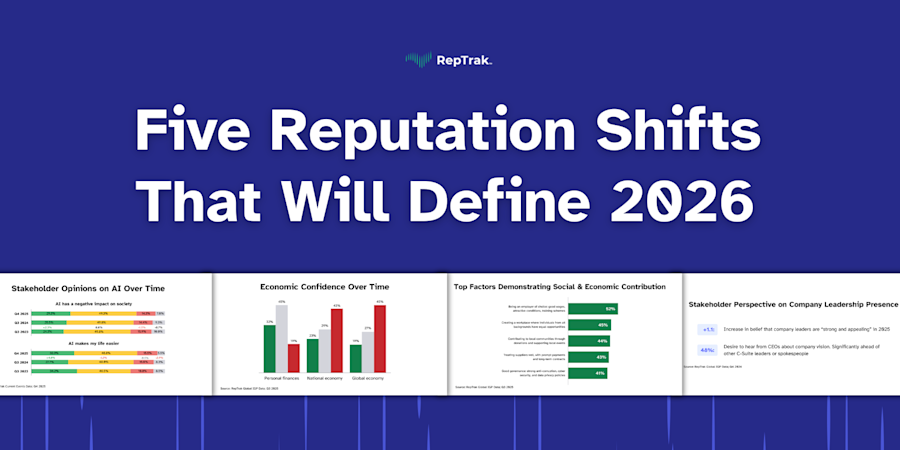7 Must-Read Books about Corporate Reputation
Blog Post18 Oct, 2018
Corporate reputation as a field of study has expanded greatly in the past few decades: scholars, analysts, and business leaders increasingly understand that managing reputation — from social media to shareholder meetings to crisis communications — is at least as important as delivering quality products and services.
The business case for reputation is clear.
In comparing the RepTrak portfolio of companies to the U.S. S&P, France’s CAC 40, and the U.K.’s FTSE 100, the most reputable companies consistently outperform the financial market. Thus, we know that reputation is an economic multiplier.
So, how can Reputation Leaders work to achieve excellence in their own companies? As you might expect, there’s no quick fix. Successful corporate reputation is a complex mix of what we call the seven drivers of business results: Leadership, Innovation, Performance, among others — all of which need rigorous communication strategies to align the General Public’s perception with reality.
Reputation is not for the light-hearted! Stakeholder needs must be met, and their trust earned.
While we can’t provide you with all the answers in the space of this blog post, we can offer you some of our favorite books on the subject that we hope will help you along your reputation journey.
Reputation: Realizing Value from the Corporate Image, by Charles J. Fombrun
We may be selfish with this one, but Fombrun, The RepTrak Company's Founder and Chairman Emeritus, literally wrote the book on reputation. The book is, not surprisingly, called ... Reputation. In his recent 20th-anniversary reissue of this seminal book on corporate reputation, Fombrun examines how the rise of the internet has made corporate reputation even more valuable in an increasingly interconnected world.
As he writes: “Reputations crystallize and coagulate from social webs: People become friends or foes, companies get typed as angels or devils, places seem appealing or not, all from exchanges of information, impressions, and imagery that propagate ever faster across both traditional media and the now ubiquitous social media that connect us as ‘friends’ on Facebook, Twitter, and Instagram to public figures and global celebrities.”
The Alignment Factor: Leveraging the Power of Total Stakeholder Support, by Cees van Riel
This book focuses on the importance of corporate communications in getting a company’s internal and external stakeholders on board—or “in alignment,” as The RepTrak Company Co-Founder van Riel would say—with their business objectives. The greater the alignment between a business and its various stakeholders, the easier it will be for that business to succeed through favorable regulatory treatment, positive media coverage, and loyal customers.
The 18 Immutable Laws of Corporate Reputation: Creating, Protecting, and Repairing Your Most Valuable Asset, by Ronald J. Alsop
Author Alsop spent years as a reporter at the Wall Street Journal, where he witnessed firsthand the implosion of Enron, and watched as a child abuse scandal rocked the Catholic Church. In this book, Alsop offers 18 rules for building a solid corporate reputation and protecting it through both good times and bad.
The Glass Jaw: A Manifesto for Defending Fragile Reputations in an Age of Instant Scandal, by Eric Dezenhall
This book is less of a how-to, and more of a polemic about the state of crisis communications. According to Dezenhall, companies shouldn’t waste their time spewing empty promises or feverish denials in light of a scandal; instead, they should quietly do the work of improving and refining their own processes to prevent the mistake from ever happening again. Dezenhall suggests that the best thing for your reputation isn’t talking the talk, but rather walking the walk.
Rethinking Reputation: How PR Trumps Marketing and Advertising in the New Media World, by Fraser P. Seitel and John Doorley
PR experts Seitel and Doorley discuss everything from the Lewinsky scandal to the launch of an online slipper company to show that, at its root, corporate reputation is about building relationships, and that any good relationship is built on trust. According to the authors, “Trust, one of the benefits of a good reputation, begins with not trying to fool anybody—with telling the truth, with avoiding spin.”
Corporate Reputation Decoded: Building, Managing, and Strategising for Corporate Excellence, by Avani Desai and Asha Kaul
This book offers a cross-cultural look at corporate reputation by focusing on one of the world’s fastest growing economies: India. Using case studies from real companies like Tata and Infosys, Kaul and Desai offer strategies for building and maintaining a good reputation for your business, no matter where in the world you are.
Fame and Fortune: How Successful Companies Build Winning Reputations, by Charles J. Fombrun and Cess van Riel
This solid introductory book comes complete with visuals that uses visuals and data to show, rather than tell, how to enhance corporate reputation at a given company. An accessible roadmap, this book provides real-world examples and case studies from well-known companies like FedEx. The book speaks to the power of authenticity, transparency, and consistency in business.
Did we miss any? What books inspire you and your team to keep fighting the good fight in Reputation Intelligence? Let us know on social media by using the hashtag #RepTrak!
Melanie LoBue Global Director of Marketing The RepTrakCompany @melanielobue [email protected]






